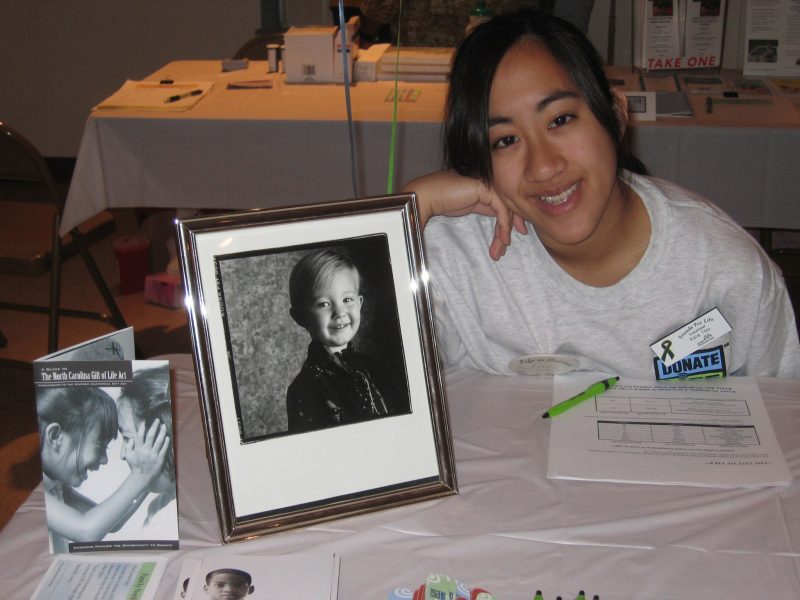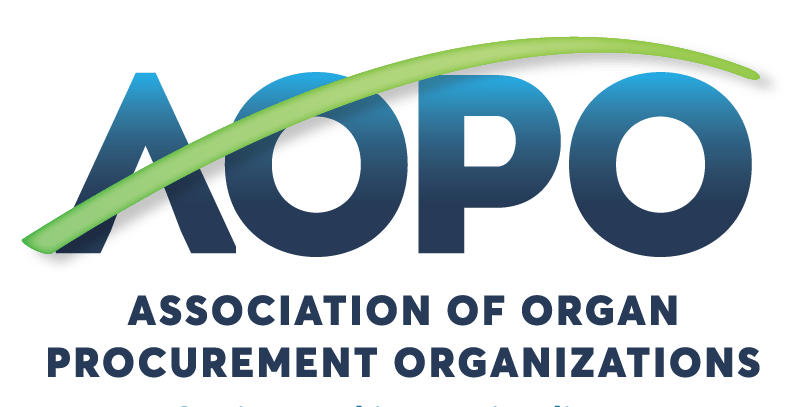On Saturday, June 20, 1992, liver recipient Kara Thio-Smith’s life was saved at only eight months old. Her donor, an 18-month-old boy named Evan Samata, tragically lost his life while on vacation in California.
“It’s hard as a mother to know that somebody else lost their child,” said Kara’s mother, Victoria Thio. “I was grateful for them because Kara got a chance to live, but he was their only child at the time, and it was really hard.”
Kara was diagnosed with biliary atresia at three months old, meaning she was missing the ducts that carry bile from the liver. At four months, her parents were told she would need a liver transplant before her first birthday to survive. Her transplant took 15 hours, and the recovery was anything but smooth—but she was alive.
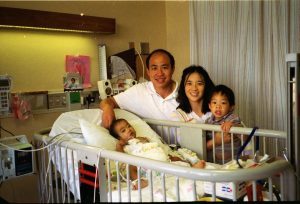
“I sent an anonymous letter to Evan’s parents the day after her transplant,” recalled Victoria. “We continued to communicate anonymously for a year or so. Evan’s parents are very creative people, and they eventually made a book with a lot of pictures of their son, Evan, that also featured letters from family and friends. They wanted to send us the book, so HonorBridge (known as COPA at the time) said it was okay for us to exchange names. They dedicated that book to Kara. From that point on, we started communicating directly.”
For the first five years of her life, Kara’s health was touch-and-go, but as the years passed, she was able to simply enjoy being a normal, albeit immunocompromised, kid.
“I don’t know if I knew the word transplant when I was really young, but I knew I had something done with my liver,” said Kara. “I knew that I had follow-ups. I have some early memories from being in the hospital, but blood draws and hospitals were very normal to me. And, of course, I’m immunocompromised. When I was younger, my mom printed these brightly colored papers to send home to my classmates’ parents, telling them that I was immunocompromised every year. At the time I was just embarrassed, because I was like mom, it’s the same kids every year! But obviously it was very good for her to do, and it was very good that she was on top of things, protecting me.”
Kara, who just assumed that all kids went to the hospital and got monthly blood draws, never felt like she was missing out—although she did have to wait until she was 8 or 9 to ride a bike without training wheels.
“I just thought I was incompetent at the time, but it turns out my parents didn’t let me do that because they were afraid that I would fall and hurt my enlarged spleen,” said Kara, laughing. “Fortunately or unfortunately, I’m a very uncoordinated person, so I did not take to dance or sports!”
Kara and her family first met her donor’s family in 1998, when she was almost seven years old. “We go to Michigan every year for Christmas, so we made arrangements on our trip to stop in Chicago and meet them,” said Victoria. “It was really hard, because you’re so grateful for what they’ve done, but you don’t want to impose on them and keep reminding them of their loss.”
Evan’s parents were thrilled to meet little Kara, although she was still much too young to grasp the magnitude of what this moment meant to everyone involved.
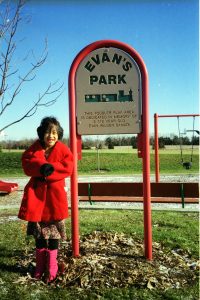
“When we went to meet them, they greeted me, and I was like, “well, you know who I am!” said Kara. “I was just carefree, without any anxiety over it. To me, it was just meeting new people. I was aware of it, but I didn’t really understand the impact until I was much older. When I saw them again as a teenager, I knew what it meant to meet my donor family. I understood that they made the choice to share the gift of life with me. At that point, it was very intense.”
Because donation was so normalized in their household, Kara and her mother can’t recall a specific conversation they had about her transplant. “We wanted her to have as normal a life as possible,” said Victoria. “We would have loved to have kept her in a bubble, but that wouldn’t have been good for her or for our family, either. She always knew that she had a new liver, I don’t recall a specific time of telling her. She would come with me to different donation awareness events over the years. It was just part of our normal, everyday life.”
After high school, Kara attended UNC Chapel Hill, studying psychology with a biology minor and graduating with honors. She now works at NC State University, has three cats, and married her wife, Cassie, in 2019.
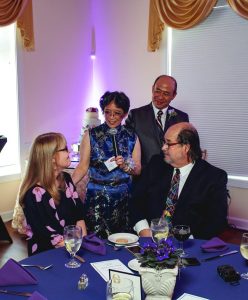
“Honestly, I think my biggest bragging point is that I have been able to live a typical life,” said Kara. “I had the same ups and downs that everybody goes through, and the reason I was able to have such a typical experience is because I was given the chance. Someone made the choice to share the gift of life in a time of such intense grief. That choice has such an impact, and it gave me just a chance to even experience life. I’ve met several transplant recipients over the years, and the amount of gratitude everybody has is amazing. For infant transplant recipients like me, that’s all we’ve ever known.”
As an immunocompromised adult, Kara must take extra precautions but continues to enjoy health.
“My health in adulthood has been pretty typical,” said Kara. “Certainly, the pandemic affected things, and kind of put the spotlight on the fact that I’m immunocompromised, but my health has been pretty okay. I am down to one liver-related medication, so I take one in the morning and one at night. I have my annual check-ups with my transplant team that I’m followed by at UNC, but that’s really it.”
Both Kara and her mother have advocated for organ donation over the years, from involvement in congressional hearings, health fairs, public speaking events, and even a ride on the Donate Life float in the 2012 Rose Bowl Parade. Victoria also regularly volunteers as a DMV ambassador with Donate Life and does presentations for driver’s ed. As a recipient, Kara is immensely grateful for everyone who says ‘yes’ to saving lives.
“The impact that you will have just by saying ‘yes’ is so great,” said Kara. “I know that people don’t really like thinking about death, but registering your decision to be an organ, eye, and tissue donor really does save people’s lives. It really matters and affects so many people. It may seem like a simple question, but it has a ripple effect. As a recipient, I’m just so grateful for the people who do say ‘yes’ and are able to share the gift of life with others after they pass on.”

75 lives could be saved and healed from one organ, eye, and tissue donor. Together, we can save lives. Register your decision today at honorbridge.org/registerme
